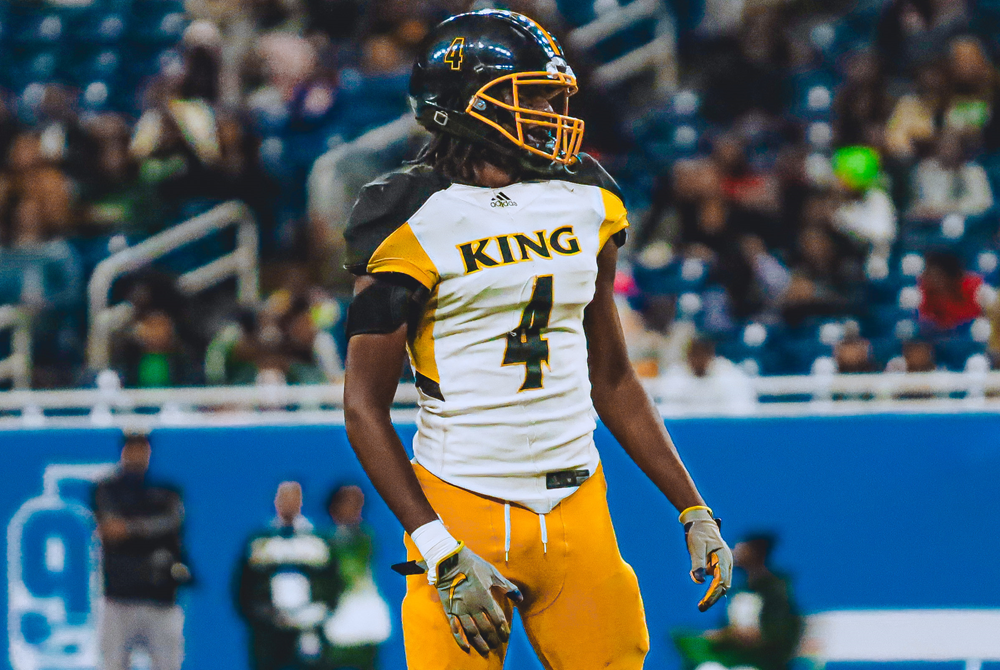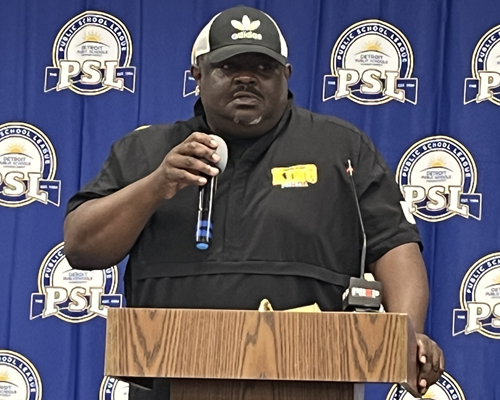
Keep on Coaching
February 1, 2013
By Geoff Kimmerly
Second Half editor
A few weeks ago, I finally got my first chance this season to watch a friend coach his basketball team. After guiding some others at the lower levels, this is his first time running the varsity – something he wasn't sure he wanted to do with a 1-year-old just learning to walk, but a challenge he ended up taking on to the benefit of all those involved.
Simply put, he’s good. I've seen a lot of teams and a lot of coaches over the past 15 years, and although I wouldn't know much of what to do if I were walking the sideline, I felt pretty qualified in telling him I was impressed – even if he didn't buy that I was offering an unbiased opinion. The best news is he’s gone from not sure about this a few months ago to talking about next season.
We know, at least anecdotally, that coaching continues to get more challenging. The time commitment has grown substantially to make running a program a year-round endeavor in a lot of sports at a lot of schools.
That commitment – especially for coaches with children of their own – was a main reason referred to in a New Haven Post-Chronicle story Saturday that noted 23 football coaching openings in Connecticut at one point this offseason. That state has 146 football teams – meaning roughly 15 percent will have new leaders this fall.
And that got me thinking about my friend, about how glad I am he’s given this a shot, and how I've seen so many others either not do so, or not stick around long despite having some pretty nice success.
A study published last winter in Interscholastic Athletic Administration magazine – a product of the National Interscholastic Athletic Administrators Association – noted some predictable results of a study that sought to determine the biggest challenges faced by first-year high school coaches.
The toughest according to the study was balancing the demands of coaching and teaching, experienced by nearly half the respondents – 98 percent of which coached high school teams and 81 percent of which are teachers.
The next six reasons all were noted by at least 30 percent of those in the study – personal fatigue, securing community support, securing and caring for facilities and equipment, parental contact, keeping non-starting players motivated, dealing with schedule interruptions and motivating athletes to achieve consistent, peak performance.
Nothing there is earth-shaking, and most if not all of these challenges are faced by high school coaches regardless of how long they've been in the field. But I got a little more perspective from some of the 32 items that ranked as least challenging to the first-year leaders – keeping in compliance with state and league regulations, dealing with substance abuse issues, teaching sport skills and creating a positive team atmosphere – things that seem most important, and yet appear to be easiest to do. I’m not sure what that tells us – but I think it tells us something.
Click to check out the entire three-page breakdown of the study, plus the researchers’ recommendations to remedy some of what first-year coaches face.
Giving back to Saginaw
I love reading about high-level athletes – like a star-studded group of alums from Saginaw – giving back to where they got their starts.
Pittsburgh Steelers star LaMarr Woodley made a big impact before the start of this school year by donating $60,000 to cover all participation fees for athletes in his former school district. The Saginaw News’ Hugh Bernreuter writes today about how Woodley (Saginaw High), the Philadelphia 76ers’ Jason Richardson (Saginaw Arthur Hill) and former Oakland Raiders standout Stu Schweigert (Saginaw Heritage) have combined to give more than $865,000 back to their home communities.
Bernreuter also mentions the non-monetary contributions of the Golden State Warriors’ Draymond Green (Saginaw High) and former Indianapolis Colts receiver Blair White (Saginaw Nouvel).
Click to read more about it.
Quote(s) of the Week
While rifling through more papers on my desk, I found an article from the Washington Post from Sept. 2011 titled “How high school sports save our schools.” I was drawn to it in part because I spent more than a decade in a newsroom, and it was a piece by a reporter covering education who instead of reporting on school boards and the like, delved into the importance of interscholastic athletics to education as a whole.
He spoke of how participation continues to grow even as resources dwindle, and of data supporting that extracurriculars like sports are more effective than academic classes in teaching leadership, teamwork, time management and “other skills crucial for success in the workplace.” Later, he mentioned a study noting that those who participate in extracurriculars earned more a decade later.
Click here to read the entre piece. These passages struck me most.
“Coaches might be the only faculty members still allowed by our culture and educational practice to get tough with students not making the proper effort. They have the advantage of teaching what are essentially elective non-credit courses. They can insist on standards of behavior that classroom teachers often cannot enforce because the stakes of dismissing or letting students drop their courses are too high. …
“Students do better in activities they choose. If we provide more of them, led by committed adults … that can make a difference. We know the bad news about education. Dropout rates are high. Achievement scores are stagnant. But sports participation is going up, despite pressure to cut it back. Let’s cheer about that and look for a way to draw in more students.”

King Eager to Begin Next Championship Pursuit Following Familiar Leader Patrick
By
Keith Dunlap
Special for MHSAA.com
August 22, 2024
DETROIT — To many around the state, it was a collective gasp and curiosity as to how the Detroit Martin Luther King football program would move forward.
 To those within the King program itself, it was a collective shoulder shrug and “we’ll be fine.”
To those within the King program itself, it was a collective shoulder shrug and “we’ll be fine.”
Days after a 26-20 loss to Mason in a Division 3 Semifinal last fall, King saw longtime head coach Tyrone Spencer leave to take the same job at East Kentwood.
It was no small loss, given Spencer had guided the Crusaders to one Division 2 and three Division 3 championships over eight seasons.
Not long after, longtime assistant Terel Patrick was named the new head coach for King. But even he was still processing what happened.
“A little bit of shock,” Patrick said of his initial reaction. “Every year, there were people trying to gauge whether he would or not leave. It wasn’t new that people were interested in him because he did that good of a job. But he always said no. With him saying yes, it kind of shocked me a little bit.”
But after the initial shock, it became business as usual for one of the top programs in the state.
Spencer certainly didn’t leave the cupboard bare in terms of the elite blue-chip talent the program usually enjoys, and there was about as much continuity in a coaching transition as one could hope.
All of King’s assistants stayed with the program, and Patrick said 14 are graduates of the school. Patrick has been on King’s staff since 2009 and called the continuity within the coaching staff a “unique situation.”
 “Spence was always in charge of the defense, and I was always in charge of the offense,” Patrick said. “The biggest thing for me was that I had to relearn a different side of the football.”
“Spence was always in charge of the defense, and I was always in charge of the offense,” Patrick said. “The biggest thing for me was that I had to relearn a different side of the football.”
To do that, Patrick spent the offseason at clinics and in phone conversations with defensive experts he knows. “Just to pick their brains and see what they think in certain situations,” he said.
Patrick shouldn’t be too concerned about picking up any new defensive acumen, given it helps to have supreme talent as always.
Senior defensive ends Xavier Newsom and Willie Fletcher, Jr., are highly-rated college prospects and considered among the best players in the state. Newsom said because the coaching staff remained mostly intact after Spencer left, there was no need to reassure the rest of the team and others that everything would be OK.
“We didn’t have to do that,” he said. “We still had Coach TP, so it’s not like we got a whole new coach. We told everybody that the program is still going to be the same. Nothing is going to fall off.”
King also should be loaded on offense, with sophomore quarterback Darryl Flemister coming off a terrific freshman year as the starter. He is already on the radar of prominent college programs.
Junior running back Michael Dukes rushed for 925 yards last year as a sophomore, while shifty senior slotback David Calmese is also back.
“The biggest thing is keeping the main goal the main goal,” Calmese said.
The coaching change certainly wasn’t enough to change the expectations of others within the Detroit Public School League. The Crusaders were picked to win the Blue division ahead of rival and fellow state power Detroit Cass Tech.
In addition to still being talented, King will be plenty motivated after not making it down the street to Ford Field last year thanks to the Semifinal loss to Mason.
“We’re not used to losing,” Newsom said. “Seeing us fall short, it definitely made us hungry.”
 Keith Dunlap has served in Detroit-area sports media for more than two decades, including as a sportswriter at the Oakland Press from 2001-16 primarily covering high school sports but also college and professional teams. His bylines also have appeared in USA Today, the Washington Post, the Detroit Free Press, the Houston Chronicle and the Boston Globe. He served as the administrator for the Oakland Activities Association’s website from 2017-2020. Contact him at [email protected] with story ideas for Oakland, Macomb and Wayne counties.
Keith Dunlap has served in Detroit-area sports media for more than two decades, including as a sportswriter at the Oakland Press from 2001-16 primarily covering high school sports but also college and professional teams. His bylines also have appeared in USA Today, the Washington Post, the Detroit Free Press, the Houston Chronicle and the Boston Globe. He served as the administrator for the Oakland Activities Association’s website from 2017-2020. Contact him at [email protected] with story ideas for Oakland, Macomb and Wayne counties.
PHOTOS (Top) Detroit Martin Luther King’s Xavier Newsom awaits the next play during last season’s Detroit Public School League Blue championship game at Ford Field. (Middle) First-year Crusaders head coach Terel Patrick speaks during PSL media day Aug. 1. (Top photo by Olivia B. Photography; middle photo by Keith Dunlap.)

